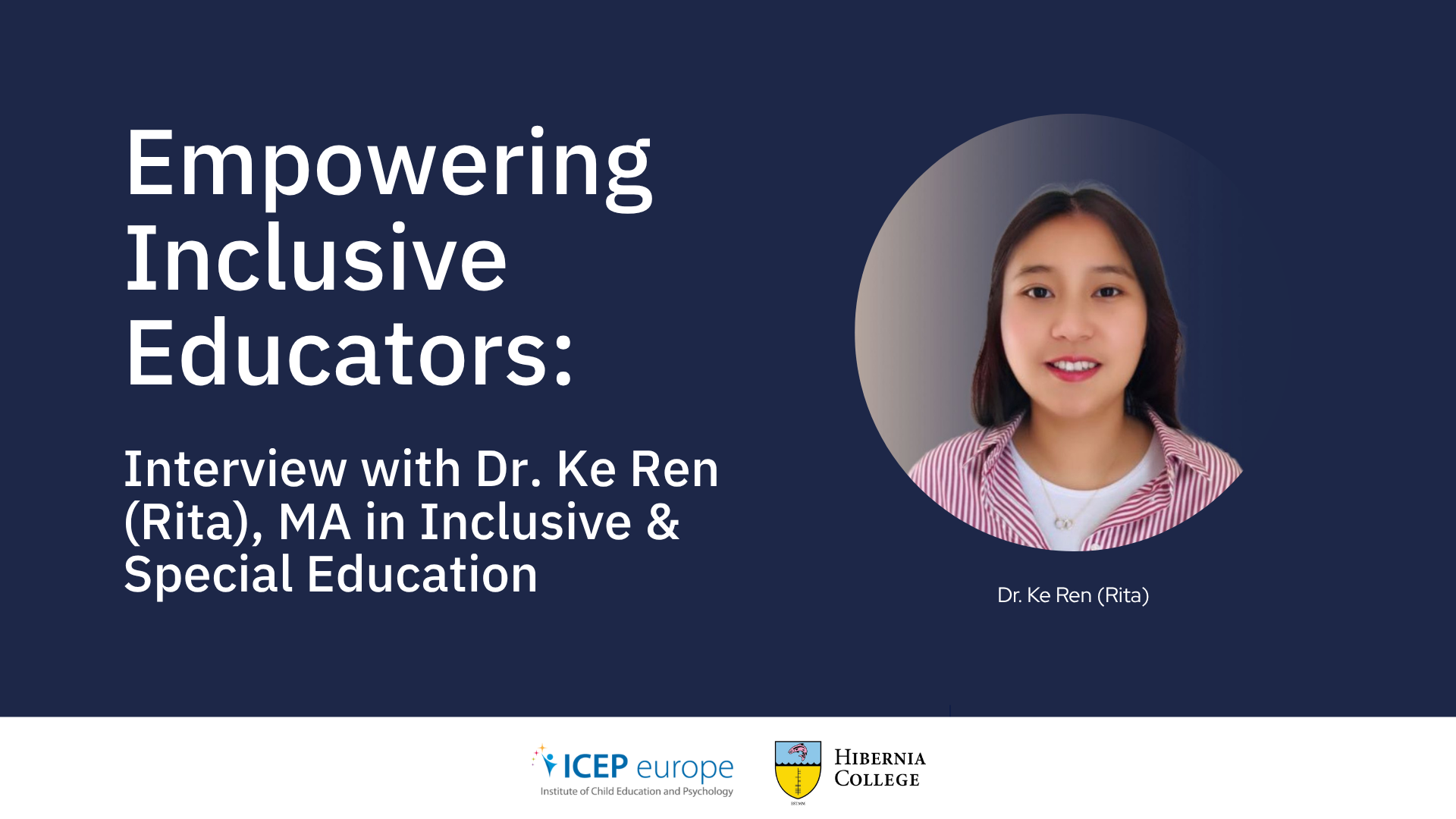Interview with Dr. Ke Ren (Rita), MA in Inclusive & Special Education

The MA in Inclusive and Special Education, a joint programme from ICEP Europe and Hibernia College, is designed for professionals passionate about creating inclusive learning environments. In this interview, we speak with Dr. Ke Ren (Rita), module lead for the Research Methods and Thesis module, about her background, research interests, and what students can expect from the thesis journey.
What is your own background?
Before entering academia, I worked as an early intervention specialist, supporting children with complex needs and their families across both educational and clinical settings. I’ve also worked as a teacher in both early years and primary school contexts, with a strong focus on inclusive practice and collaboration with multidisciplinary teams. These experiences continue to shape how I approach teaching, learning, and research today.
What are your key research interests?
My interests span inclusive education, educational psychology, early intervention, and the role of fathers in supporting children with special educational needs and disabilities (SEND).
I’m particularly passionate about creating inclusive environments where all learners feel valued and supported. My research also explores the lived experiences of families of children with SEND, especially those from marginalised or migrant backgrounds and how education systems can better meet their needs.
I also have a keen interest in research methodologies—how different theoretical frameworks and theories of change can inform educational practice. My approach is often interdisciplinary, drawing on psychological theory to guide impactful research.
What is your role in the MA in Inclusive and Special Education?
I’m the module lead for the Research Methods and Thesis module on the programme. What I love most is supporting our learners, many of whom are teachers, educators, and professional parents as they develop and carry out their own research projects.
I’m always fascinated by the meaningful, often overlooked, questions they choose to explore in their own educational or community-based settings. It’s a real privilege to be part of their journey, from the early stages of shaping an idea to seeing a project fully developed, implemented, and written up. The diversity and depth of these projects constantly inspire me.
Can you give an overview of the Research methods and Thesis module?
Delivered over three semesters, the module supports students to conduct a small-scale research project within their own professional or community context. Students:
- Choose a topic that’s meaningful to them
- Design and carry out a research study
- Collect and analyse data
- Write a 12,000-word thesis
Support is provided through live webinars, a face-to-face induction workshop, drop-in sessions, and one-to-one supervision. We often encourage approaches such as action research or case studies, especially where learners aim to implement change in their own educational settings.
Whether you work in a school, early years service, or a community organisation, the module builds your ability to carry out practical, impactful research.
What advice do you give to people when choosing a research topic?
Choose a topic that genuinely matters to you – something you’re passionate about and curious to explore. Your research voice is important, and this is a chance to focus on a question or issue that you’ve observed in your own context, whether that’s in your workplace or a community setting.
It’s also important to make sure your topic is feasible for a small-scale project. Keep the scope manageable, and work towards having a clear and focused research question. Often, the best topics come from real challenges or questions you’ve encountered in practice, something you want to understand better or improve. When the topic feels meaningful and relevant to you, the research journey becomes much more engaging and rewarding.
What type of support is available when conducting the thesis?
The module is very well-structured, well-supported, and entirely doable, even if you’ve never done research before. Support is built into every stage of the journey.
- Five live webinars and optional drop-in sessions
- A face-to-face induction workshop to help identify topics and build community
- A face-to-face mid-term methodology workshop focusing on ethics and data collection
- An assigned individual supervisor, who will support you throughout the entire process
- Step-by-step, carefully designed online content covering every part of the process
Everything is set up to support you in developing a meaningful, manageable research project from start to finish.
What interesting topics have graduates covered in the programme to date?
Graduates have explored a wide range of meaningful and practice-based topics, often rooted in their own professional and personal settings.
Our graduates have undertaken a wide variety of projects, including:
- Teacher professional development
- Inclusive schoolyard design for autistic pupils
- Strategies for supporting learners with dyslexia
- Applying Universal Design for Learning (UDL) principles to subjects like mathematics
- Creating inclusive strategies through school-based focus groups
The topics are as diverse as our learners’ professional contexts, but what they share is a commitment to improving practice and promoting inclusion.
What career options are available to graduates of the Masters?
Graduates of the Master’s programme go on to a wide range of rewarding career paths. Many take on leadership roles within their schools or educational settings, such as positions in school management or leading inclusive practice initiatives. Others move into leadership or advocacy roles within NGOs, community organisations, or education-focused charities etc.
Some graduates are inspired to continue their academic journey, pursuing PhDs, becoming researchers, or even moving into lecturing roles in higher education. The programme provides a strong foundation in both practice and research, so it opens up possibilities in policy development, consultancy, and project work across the broader education and social inclusion sectors.
Explore the MA in Inclusive and Special Education today and take the next step in your professional development.